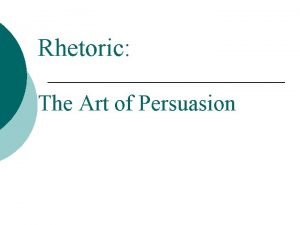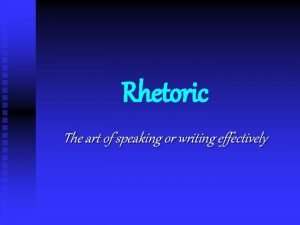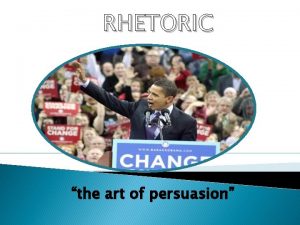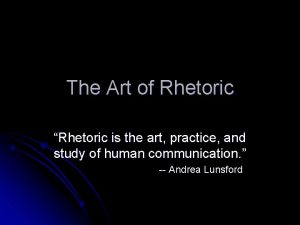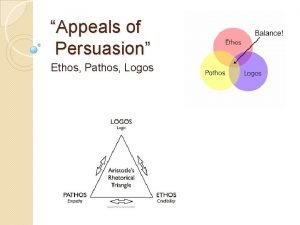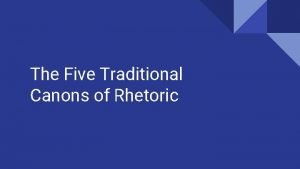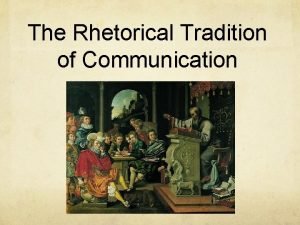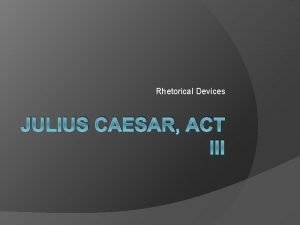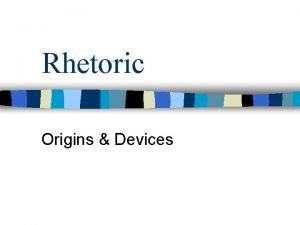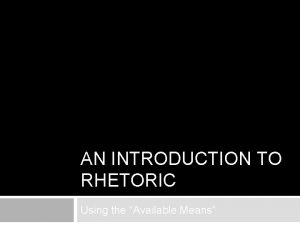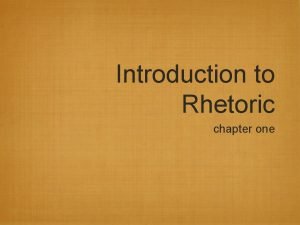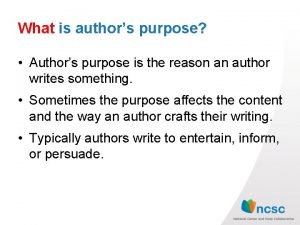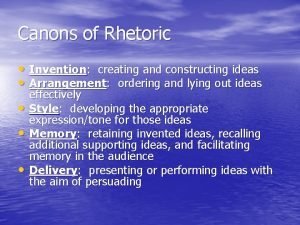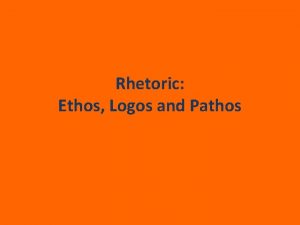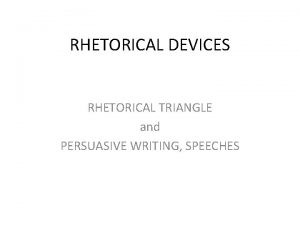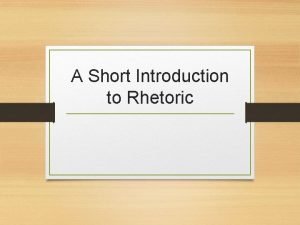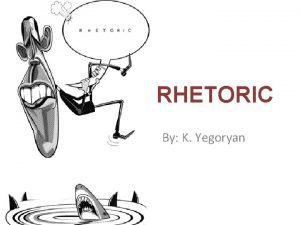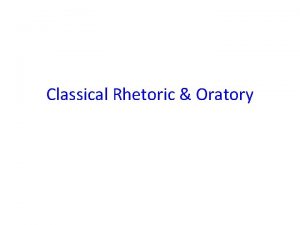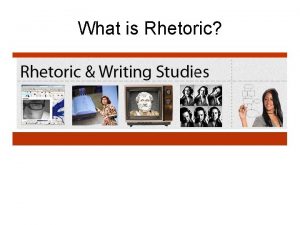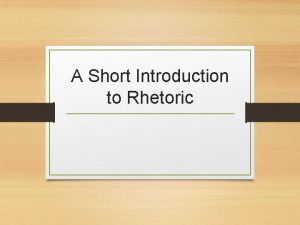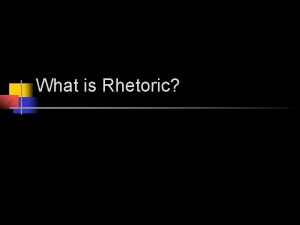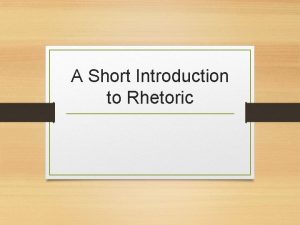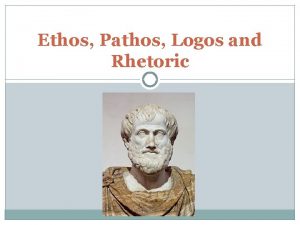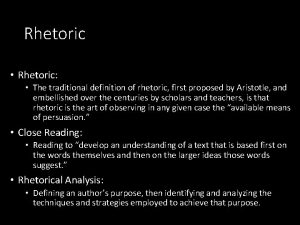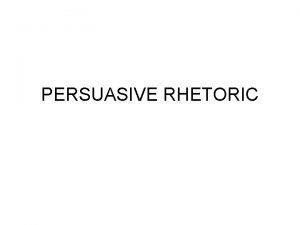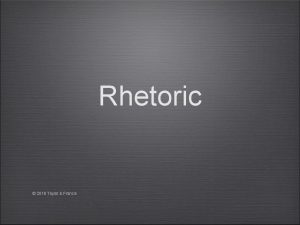The Art of Rhetoric Rhetoric is the art



















- Slides: 19

The Art of Rhetoric “Rhetoric is the art, practice, and study of human communication. ” -- Andrea Lunsford

What is Rhetoric? (n) the art of speaking or writing effectively l According to Aristotle, rhetoric is “the ability, in each particular case, to see the available means of persuasion. ” l l He described the three main forms of rhetoric as: Ethos, Logos, and Pathos “Rhetoric is the study of misunderstandings and their remedies. ” -- I. A. Richards

The Rhetorical Triangle Speaker Logos PURPOSE Audience Subject

The Persuasive Appeals l The best arguments rely on using three persuasive appeals—logical (logos), ethical (ethos), and emotional (pathos)—and a savvy writer will know when to use each in order to accomplish his intended purpose or purposes.

Analyzing PURPOSE Ask these questions when deciding on purpose: 1. Does the author wish for the audience to think about or to reconsider an idea or issue? If so, exactly what are the ideas or issues, and what new view does the author wish for the audience to consider?

Analyzing PURPOSE 2. 3. Does the speaker want the targeted audience to take action? If so, exactly what action? Does the speaker or writer want the targeted audience to feel a certain way? If so, exactly what emotion or emotions does he/she attempt to evoke?

Persuasive Appeal: ETHOS l This is an ETHICAL or value-based appeal (think ETHICS) l Speaker/writer appeals to own credibility and character l It draws upon the audience’s virtue, morals, and prudence

Ethos: Core Questions l How does the writer or speaker present herself/himself as reliable, good? l How does the speaker or writer aim to build bridges with the audience or opposition?

Qualities of Effective Ethos l Controlled diction (avoidance of inflammatory language) l Makes qualified claims (notes exceptions to rules; uses terms such as “perhaps, some, many”) l Restates opposing views fairly/accurately l Associates self with relevant authorities; makes relevant allusions l Uses first-person plural pronouns “we” and “us” to establish a connection between writer & audience.

Persuasive Appeal: LOGOS This is a logical appeal (think LOGIC) l It draws upon the audience’s sense of reason using facts, statistics, and evidence l Everyday arguments rely heavily on ethos and pathos, but academic arguments rely more on logos l

Logos: Core Question How has the writer or speaker attempted to appeal to the audience’s reasoning or logic? l This is usually accomplished through Inductive Reasoning: specific to general conclusion Deductive Reasoning: general to specific conclusion l

Qualities of Effective Logos l To Appeal to Logic a paper or speech would include the following: l l l l l Theoretical, abstract language Denotative meaning/reasons Literal and historical analogies Definitions Factual data/statistics Quotations Citations from experts and authorities Informed opinions Tradition Cause/effect

Concession l l l A concession is an expression of concern for the feelings of those who may disagree with the writer’s position. Using concession is a good way to overcome the reader’s resistance to a controversial position. Concession shows the writer/speaker to be a logical thinker and a concerned, fair-minded person who realizes that every argument has two sides.

More on Concession l Using concession takes away the major weapon of the opposition. The following terms are effective in making concessions: l Admittedly Even though I can’t argue with Undoubtedly I concede that Granted Certainly…, but Yes…, but It goes without saying that While it is true that l l l l l

Counterargument has three parts: l Acknowledging—writers let readers know they are aware of the readers’ position which is against the writers’ (concession) l Accommodating—writers accept objections to their arguments (“setting them up”) l Refuting—then last, writers propose their objections to readers’ position (“shooting them down”) *Refutation is asserting that an opponent’s arguments are wrong and arguing against them. )

Persuasive Appeal: PATHOS This is an EMOTIONAL appeal l It draws upon the audience’s feelings and sentimentality l l There may be any number of emotions involved: love, fear, patriotism, guilt, hate, or joy l Although the pathetic appeal can be manipulative, it is the cornerstone of moving people to action.

Qualities of PATHOS Connotative diction, imagery, metaphors l Appeals to pity, compassion—the qualities that unite all humans l Carefully crafted syntax such as parallelism, anaphora, etc. to appeal to the reader’s sense of order and control l

Rhetoric l Although the components of rhetoric sound complex, at its most basic level RHETORIC is simply language that effectively accomplishes its purpose

Work Cited Advanced Placement Strategies, Laying the Foundation. Dallas, TX: Advanced Placement Strategies, Inc. ,
 Rhetoric the art of persuasion
Rhetoric the art of persuasion Ethos
Ethos The art of writing or speaking effectively
The art of writing or speaking effectively Rhetoric: the art of persuasive writing and public speaking
Rhetoric: the art of persuasive writing and public speaking Rhetoric is the art of
Rhetoric is the art of Ethos, pathos, logos
Ethos, pathos, logos Canons of rhetoric
Canons of rhetoric Rhetorical tradition example
Rhetorical tradition example Grammar as rhetoric and style parallel structures answers
Grammar as rhetoric and style parallel structures answers Rhetorical devices in julius caesar act 1
Rhetorical devices in julius caesar act 1 Aristotle rhetoric
Aristotle rhetoric An introduction to rhetoric using the available means
An introduction to rhetoric using the available means Poetry vs rhetoric
Poetry vs rhetoric Parallelism rhetorical devices
Parallelism rhetorical devices How is rhetoric defined in this chapter
How is rhetoric defined in this chapter Author
Author Canons of rhetoric
Canons of rhetoric Hugh blair lectures on rhetoric
Hugh blair lectures on rhetoric Pathos logos ethos
Pathos logos ethos Ethos definition literature
Ethos definition literature
